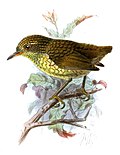Myrmoderus
Appearance
| Myrmoderus | |
|---|---|

| |
| White-bibbed antbird (Myrmoderus loricatus) | |
| Scientific classification | |
| Domain: | Eukaryota |
| Kingdom: | Animalia |
| Phylum: | Chordata |
| Class: | Aves |
| Order: | Passeriformes |
| Family: | Thamnophilidae |
| Genus: | Myrmoderus Ridgway, 1909 |
| Type species | |
| Myiothera loricata[1] Lichtenstein, 1823
| |
Myrmoderus is a genus of passerine birds in the family Thamnophilidae.
The genus contains five species:[2]
- Ferruginous-backed antbird (Myrmoderus ferrugineus)
- Cordillera Azul antbird (Myrmoderus eowilsoni)
- Scalloped antbird (Myrmoderus ruficauda)
- White-bibbed antbird (Myrmoderus loricatus)
- Squamate antbird (Myrmoderus squamosus)
The Cordillera Azul antbird was first described in 2018.[3] The other four species were formerly included in the genus Myrmeciza. A molecular phylogenetic study published in 2013 found that Myrmeciza, as then defined, was polyphyletic.[4] In the resulting rearrangement to create monophyletic genera four species were moved to the resurrected genus Myrmoderus.[2] The genus had originally been erected in 1909 by the American ornithologist Robert Ridgway with the white-bibbed antbird as the type species.[5]
References
[edit]- ^ "Thamnophilidae". aviansystematics.org. The Trust for Avian Systematics. Retrieved 2023-07-16.
- ^ a b Gill, Frank; Donsker, David, eds. (2018). "Antbirds". World Bird List Version 8.1. International Ornithologists' Union. Retrieved 30 January 2018.
- ^ Moncrieff, A.E.; Johnson, O.; Lane, D.F.; Beck, J.R.; Angulo, F.; Fagan, J. (2018). "A new species of antbird (Passeriformes: Thamnophilidae) from the Cordillera Azul, San Martin, Peru". Auk. 135 (1): 114–126. doi:10.1642/AUK-17-97.1.
- ^ Isler, M.L.; Bravo, G.A.; Brumfield, R.T. (2013). "Taxonomic revision of Myrmeciza (Aves: Passeriformes: Thamnophilidae) into 12 genera based on phylogenetic, morphological, behavioral, and ecological data" (PDF). Zootaxa. 3717 (4): 469–497. doi:10.11646/zootaxa.3717.4.3. PMID 26176119.
- ^ Ridgway, Robert (1909). "New genera, species and subspecies of Formicariidae, Furnariidae, and Dendrocolaptidae". Proceedings of the Biological Society of Washington. 22: 69-74 [70].

